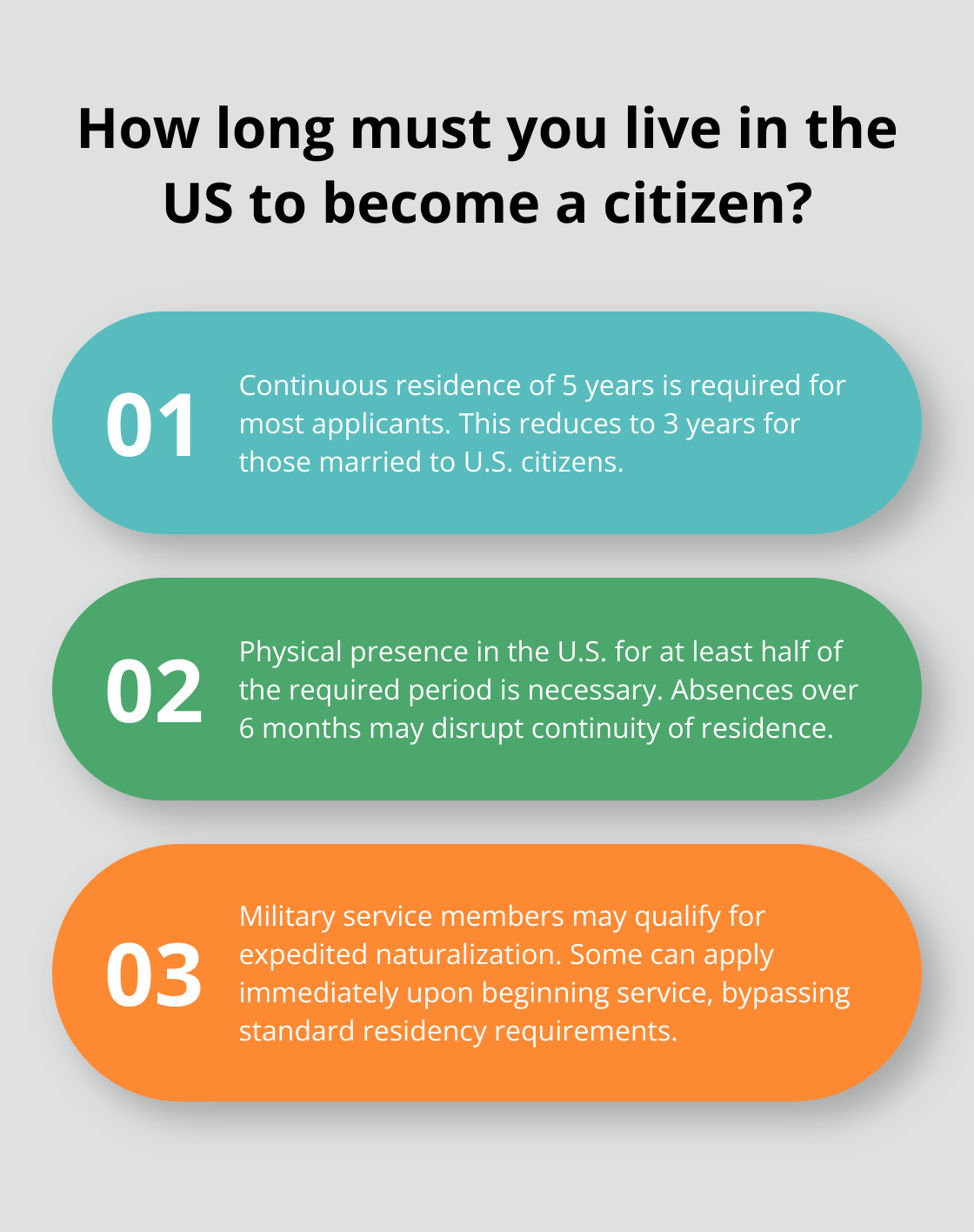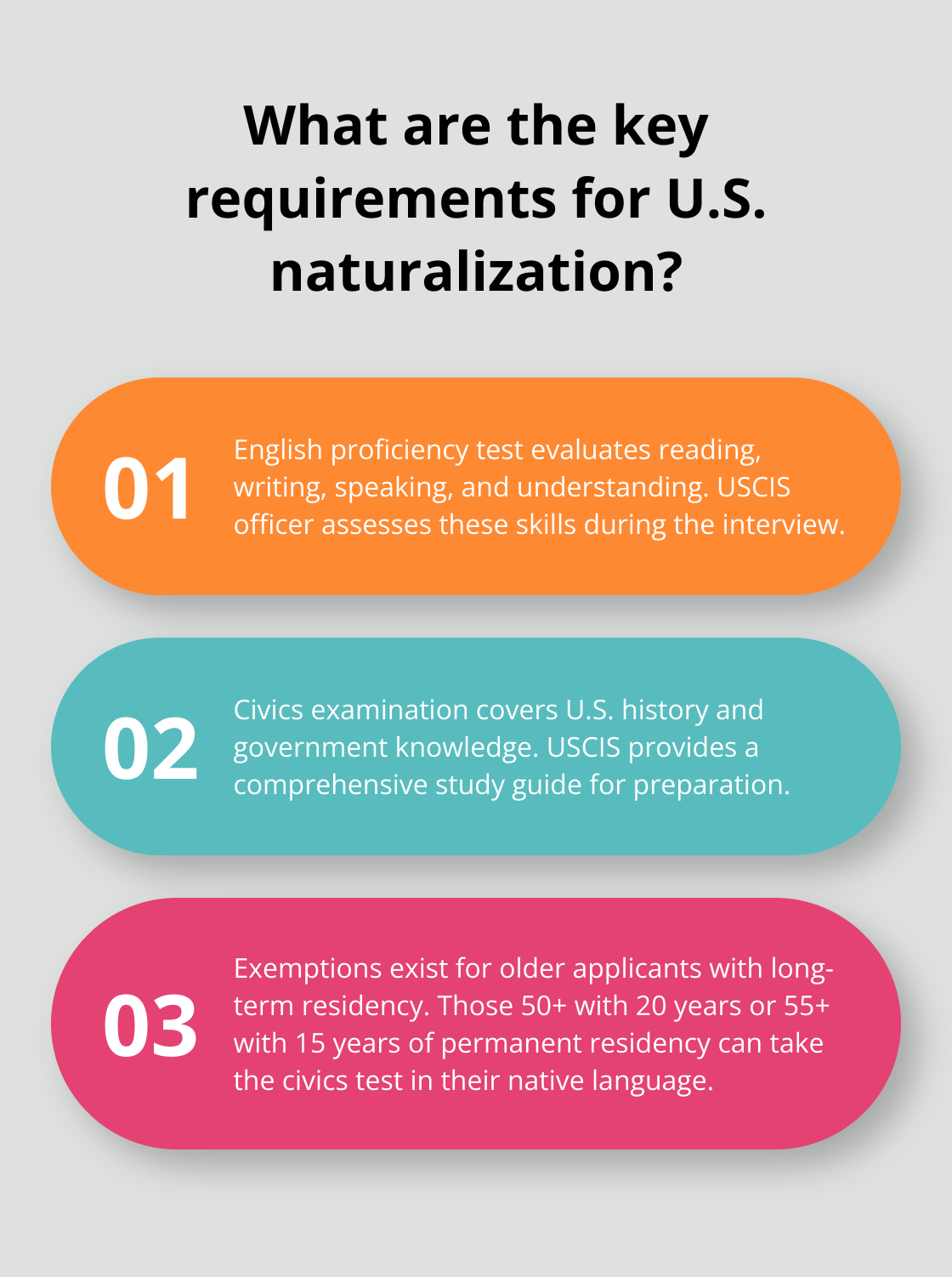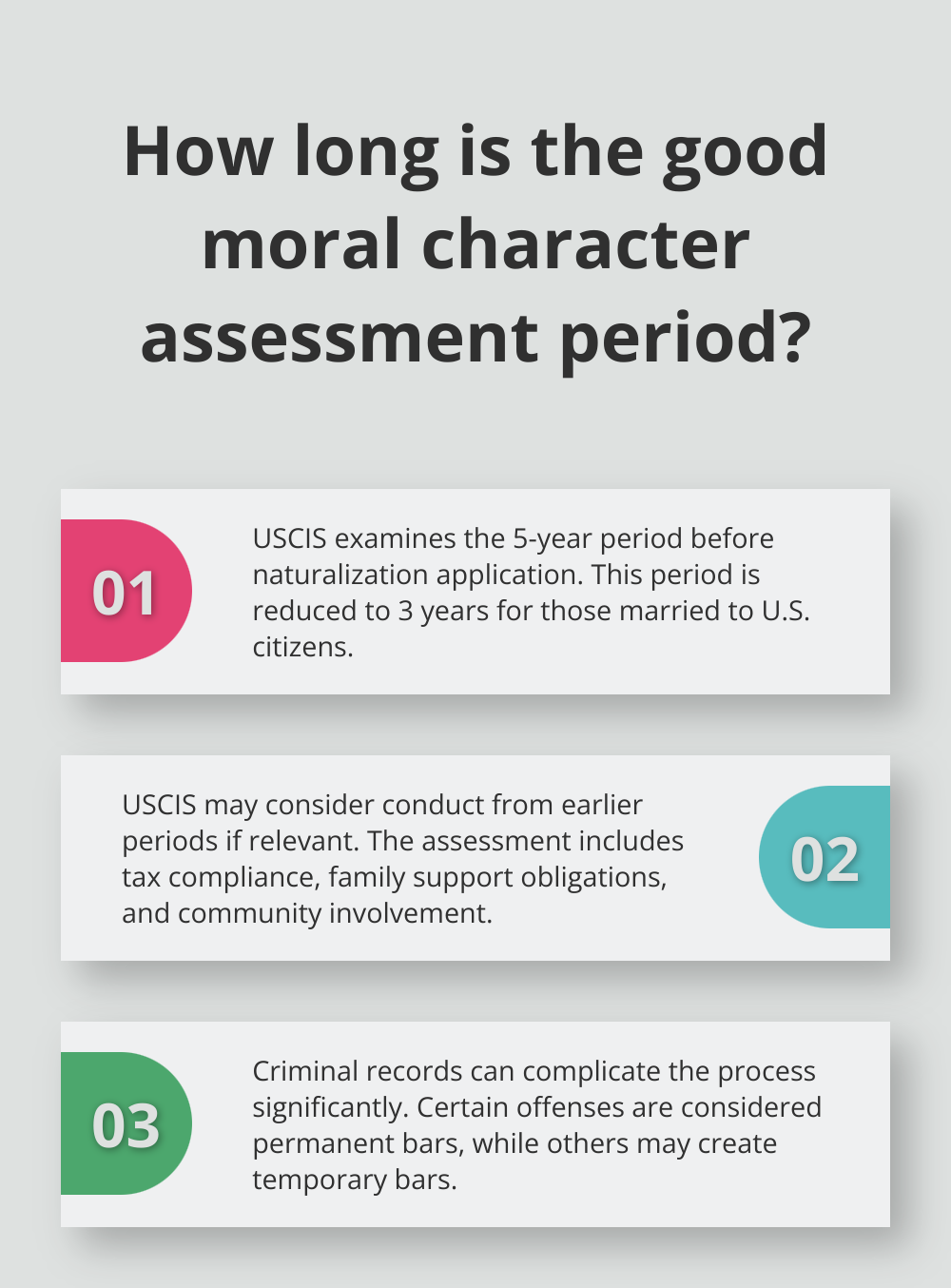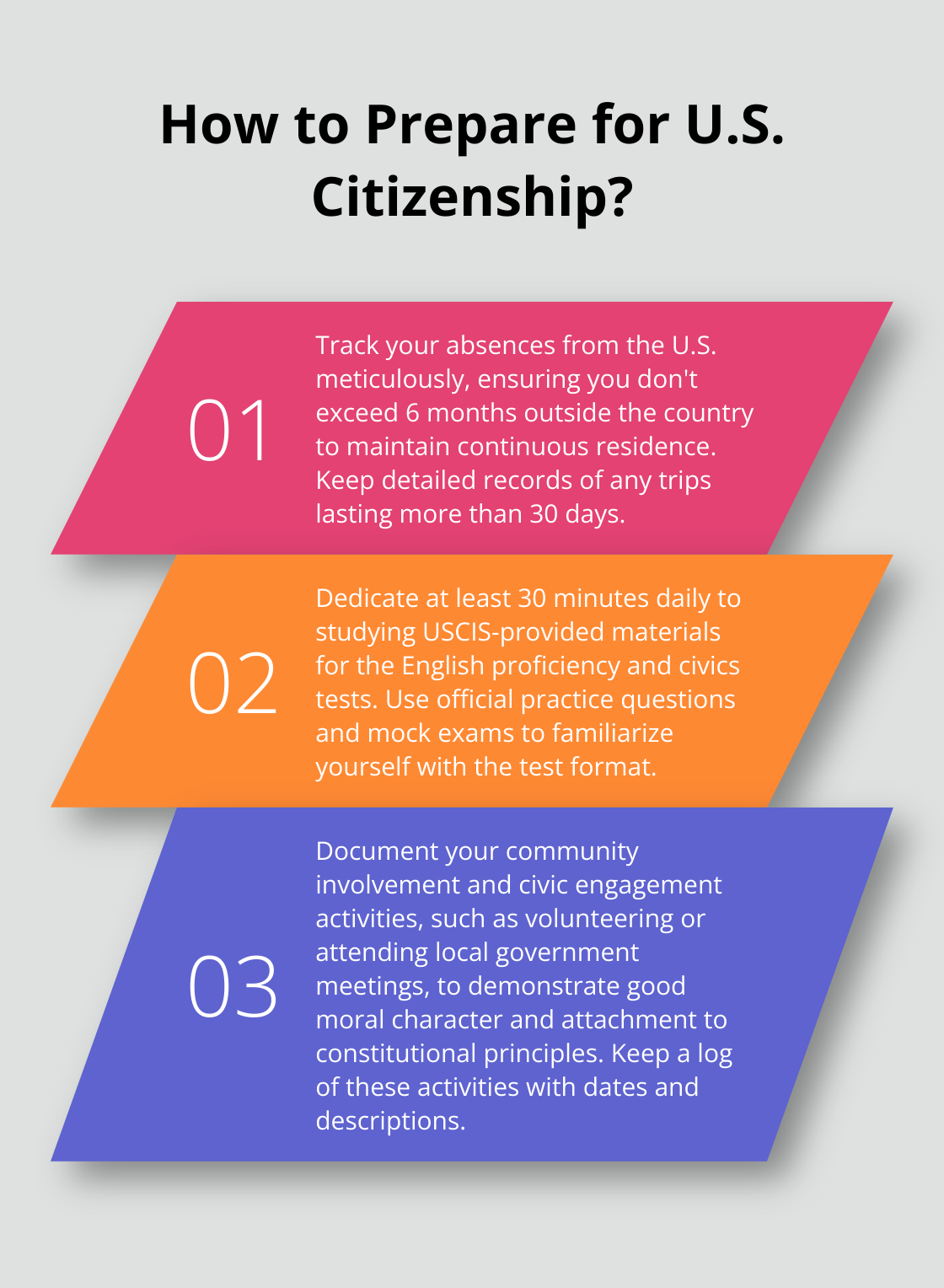
Citizenship by Naturalization: Key Conditions Explained
Becoming a U.S. citizen through naturalization is a significant milestone for many immigrants. At Law Offices of Jeffrey A. Thompson, we often guide clients through this complex process.
Understanding the conditions for citizenship by naturalization is crucial for a successful application. This post will break down the key requirements, helping you navigate the path to U.S. citizenship with confidence.
How Long Must You Live in the US to Become a Citizen?
Residency requirements form a fundamental part of the naturalization process. Many applicants find these requirements complex, as they can vary based on individual circumstances.
Continuous Residence: The Five-Year Rule
Applicants are required to show that they have resided continuously in the U.S. for five years before applying. This means you hold a green card and maintain your primary home in the United States. If you’re married to a U.S. citizen, this requirement reduces to three years.

Extended absences from the U.S. can disrupt your continuous residence. Trips outside the country lasting more than six months but less than one year may break continuity unless you prove you maintained U.S. ties. Absences of one year or more will almost always break continuity, forcing you to restart the five-year clock.
Physical Presence: Time Spent on U.S. Soil
You must also meet a physical presence requirement. This means you need to be physically present in the U.S. for at least half of the five-year period immediately preceding your application. For those applying based on marriage to a U.S. citizen, it’s half of the three-year period.
Special Rules for Military Service Members
U.S. Citizenship and Immigration Services (USCIS) provides special provisions for those who serve in the U.S. armed forces. These individuals may qualify for expedited naturalization, sometimes even immediately upon beginning their service. USCIS often waives the standard residency requirements for military personnel, recognizing their commitment to the nation.
If you’ve served honorably for at least one year during peacetime, you may qualify to apply for citizenship without meeting the usual residency requirements. During periods of hostility, you might even qualify for naturalization without any prior residency in the U.S.
Exceptions and Waivers
USCIS allows certain exceptions to these residency rules. For instance, employees of specific U.S. companies or organizations (such as American research institutes or public international organizations) may qualify for reduced residency requirements. Additionally, USCIS may grant waivers for the physical presence requirement in cases of extreme hardship to a U.S. citizen spouse, child, or parent.
As we move forward to discuss language and civics requirements, it’s important to note that meeting residency criteria is just the first step in the naturalization process. The next hurdle involves demonstrating proficiency in English and knowledge of U.S. civics.
Mastering English and Civics for Naturalization
The naturalization process requires more than meeting residency requirements. Applicants must demonstrate proficiency in English and knowledge of U.S. civics. This chapter explores these essential components of becoming a U.S. citizen.
English Language Proficiency Test
The naturalization process includes an English language proficiency test that evaluates an applicant’s ability to read, write, speak and understand English. During the interview, a USCIS officer assesses these skills through various means.

To prepare for this test, applicants should:
- Immerse themselves in English-language media
- Practice conversations with native speakers
- Use USCIS-provided study materials
Many local libraries and community centers offer free English classes specifically designed for citizenship applicants.
U.S. Civics Examination
The naturalization test is made up of two components: an English and civics test. The civics test covers fundamental knowledge about U.S. history and government.
USCIS provides a comprehensive study guide for the civics test. Applicants should dedicate time each day to studying these materials. Additionally, many smartphone apps offer practice tests that simulate the actual exam experience.
Exemptions and Accommodations
While most applicants must meet these requirements, exceptions exist. Applicants aged 50 or older who have been permanent residents for at least 20 years (or those 55 and older with 15 years of permanent residency) may take the civics test in their native language.
Individuals with certain medical conditions that affect their ability to learn English or U.S. civics may qualify for a waiver. This process requires thorough medical documentation and often benefits from legal assistance to ensure proper presentation of all necessary evidence.
The Law Offices of Jeffrey A. Thompson has guided numerous clients through these exemption processes. Their experience shows that proper documentation and presentation of medical evidence significantly increase the chances of obtaining a waiver.
As we move forward, it’s important to understand that language and civics proficiency form only part of the naturalization requirements. The next chapter will explore another critical aspect: demonstrating good moral character and attachment to the Constitution.
What Is Good Moral Character for Citizenship?
Defining Good Moral Character
Good moral character forms a key part of the naturalization process. The U.S. Citizenship and Immigration Services (USCIS) policy strictly requires that applicants have been, and continue to be, individuals of good moral character during a specific period before applying for naturalization. USCIS examines the five-year period immediately preceding the application (or three years for those married to U.S. citizens). They may consider conduct from earlier periods if it relates to the applicant’s current moral character.

USCIS assesses various aspects of an applicant’s life, including tax compliance, family support obligations, and community involvement. Failure to file tax returns or pay child support can negatively impact an application. Active participation in community service or volunteer work can strengthen an applicant’s case.
Impact of Criminal Records
A criminal record does not automatically disqualify an applicant from naturalization, but it can complicate the process significantly. USCIS categorizes certain offenses as “permanent bars” to good moral character, such as murder or aggravated felonies. Other crimes may create a temporary bar, typically for five years after the offense.
Even minor offenses can affect an application. Multiple DUI convictions or a pattern of petty crimes might lead USCIS to question an applicant’s moral character. Applicants with any criminal history should consult with an experienced immigration attorney before applying for naturalization.
Demonstrating Constitutional Attachment
USCIS requires applicants to show attachment to the principles of the U.S. Constitution. This requirement extends beyond passing the civics test; it involves demonstrating attachment to the principles of the Constitution. An applicant for naturalization must show that he or she has been and continues to be a person attached to the principles of the Constitution.
Applicants can prove this attachment through their actions and involvement in civic activities. Registering to vote (if eligible as a permanent resident), participating in local government meetings, or joining community organizations can all serve as evidence of constitutional attachment.
During the naturalization interview, USCIS officers may ask questions to gauge an applicant’s understanding and support of constitutional principles. Applicants should prepare to discuss basic concepts like freedom of speech, separation of powers, or the role of the Supreme Court to demonstrate this attachment effectively.
Positive Factors in Moral Character Assessment
USCIS considers several positive factors when evaluating an applicant’s moral character. These may include:
- Consistent employment history
- Timely payment of taxes and debts
- Volunteer work or community service
- Family responsibilities (e.g., caring for dependents)
- Cooperation with law enforcement (when applicable)
Applicants should document these positive aspects of their character thoroughly. This documentation can include letters of recommendation, certificates of achievement, or records of community involvement.
Seeking Legal Assistance
The good moral character requirement can present challenges for many applicants. Given its complexity and potential impact on the citizenship process, seeking legal assistance can prove beneficial. An experienced immigration attorney can help applicants navigate this requirement, prepare necessary documentation, and address any potential issues proactively.
Final Thoughts
The conditions for citizenship by naturalization require careful navigation and thorough preparation. U.S. citizenship offers numerous life-changing benefits, including voting rights, family petitions, and protection from deportation. These rewards make the journey worthwhile, despite its complexities.

Professional legal assistance can provide invaluable guidance through the naturalization process. An experienced immigration attorney will help you avoid potential pitfalls and streamline your application. Law Offices of Jeffrey A. Thompson specializes in guiding clients through naturalization, offering expert advice on meeting requirements.
The path to citizenship demands dedication, but the opportunities it brings are unparalleled. You will gain a sense of belonging and full participation in American society. With proper understanding of the requirements and appropriate legal support, you can successfully navigate the naturalization process and realize your dream of becoming a U.S. citizen.


